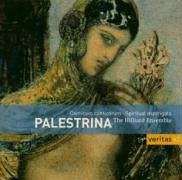| All Artists: Giovanni Pierluigi da Palestrina Title: Palestrina: Canticum canticorum: Spiritual Madrigals Members Wishing: 0 Total Copies: 0 Label: EMI Import Original Release Date: 1/1/2000 Re-Release Date: 11/4/2003 Album Type: Import Genre: Classical Styles: Opera & Classical Vocal, Historical Periods, Early Music Number of Discs: 2 SwapaCD Credits: 2 UPC: 724356223929 |
Search - Giovanni Pierluigi da Palestrina :: Palestrina: Canticum canticorum: Spiritual Madrigals
 | Giovanni Pierluigi da Palestrina Palestrina: Canticum canticorum: Spiritual Madrigals Genre: Classical
|
Larger Image |
CD Details |
CD ReviewsPalestrina and His Musical Pals Giordano Bruno | Wherever I am, I am. | 04/17/2008 (5 out of 5 stars) "There's good reason to suppose these erotically spiritual motets, which are far too polyphonic and too artistic for use in the Pope's service, were in fact written to be sung in the devotional gatherings initiated by (Saint) Phlip Neri in Rome in the 1560s and 1570s. The singers would have been Palestrina's male colleagues from the Vatican choirs, probably from the Julian Chapel choir. Palestrina had an entrepreneurial side and issued these and other motets in printed form in 1584, for the use of confraternities of musical taste hither and yon. The texts in Latin, from the Song of Solomon, would have been comprehensible to such gentlemen singers, and would have required an allegorical interpretation. This is one of the Hilliard Ensemble's finest recordings, singing one on a part with utmost rhythmic independence and fluidity, yet with faultless attacks and cadences, and deliciously precise tuning. Another reviewers faults the performance for the voice quality of countertenor David James; I'm rather sick of complaints about countertenors, but in this case, James does slightly overshadow soprano Lynne Dawson. That's the only weakness of the performance. The solution would have been to replace Dawson with a countertenor of equal sonority to David James, but such singers were scarce in 1986, when this recording was made. In any case, this is one of the best performances of Palestrina available." A voice teacher and early music fan George Peabody | Planet Earth | 03/16/2007 (4 out of 5 stars) "GIOVANNO MAY HAVE LIKED THIS DISC; BUT AS FOR ME, I SAY TSK! TSK!!
Giovanno Pierluigi da Palestrina(1525-1594) wrote in his 'First Book of Motets' (1563) the following dedication: 'The function of music in the church is the seasoning of devotion by the added delight of sweetness of song and variety of harmony,' So well did his music embody that pious belief that a commission appointed by the Council of Trent to purify the church service in 1564 left Palestrinas' compositions untouched. In all the long list of masses, madrigals and motets, there is not one that is cheap or unworthy. Purity and clarity, comparative brevity and simplicity, polyphony used with judicious reserve, the banishing of secular elements from his music,-these are the qualities which won him the title Princeps Musicae (Prince of Music)-which is engraved on his tombstone. Palestrina set the poet Petrarch's poem 'Vergine bella', a poem consisting of ten verses and a short concluding verse in praise of the Virgin to music. These 'spiritual madrigals', as they were called, reflected the mood of the Catholic revival known as the Counter-Reformation. Palestrina's motets are not only restrained, but their proportion to his total sacred output is also significantly smaller than that of other Italian composers. In only one respect was Palestrina 'modern'-namely, in his fondness for polychordal writing, which, as practised, was essentially chordal and thus allowed the words to be clearly heard. The Hilliard Ensemble does a creditable job performing this music, but I must comment that the balance is very much disturbed by the quality of the countertenor voice of David James. His voice is harsh and rough and cutting much of the time and does not blend well with the rest of the group. When I saw that Michael Chance was also singing, it encouraged me to purchase the double disc, BUT Chance only sings very briefly in 2 selections on CD 2 and none on CDl, Chance is able to soften and enrich and blend, thus mellowing somewhat the overall ensemble sound. Perhaps it does not disturb others as it seems to 'bug' me. The recording is a good representation of Palestrina's music." |

 Track Listings (18) - Disc #1
Track Listings (18) - Disc #1